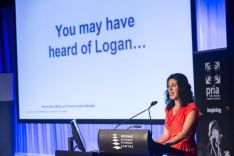Logan City comms boss criticises ‘ignorant’ journalists who perpetuate ‘lazy stereotypes’
The communications boss for one of poorer socio-economic council areas in Queensland has told a forum about her frustrations with “ignorant” journalists who perpetuate negative stereotypes of the area by writing “whatever they wanted and not feel the consequences of their action.”
In a frank presentation to the Public Relations Institute of Australia (PRIA) national conference in Brisbane yesterday, media and communication manager for Logan City Council Deanna Nott told how her team won PRIA Queensland’s award for in-house team of the year award, by reversing much of the negative media coverage the area received and helping shift the area’s “bogan” reputation
“Of course Logan rhymes with bogan. How can you change that? It’s very very difficult,” Nott told the forum. “But that is what we are doing with a dedicated seven member media team at Logan City are firmly focused on our mission to honestly and fairly reflect the Logan that more and more people are calling home every year.



Thanks Nic for highlighting how things once were for us in the great City of Logan. The relationships we now have with media have helped us achieve fantastic outcones for our community and Council – in the past quarter iSentia reported that 95 per cent of stories about the city were either positive or neutral. Like Karl Stefanovic, we would love you to visit the city. I will take you on a personal tour with our amazing, vibrant Mayor Pam Parker. Please touch base – I will even take you to Poppy’s Chocolates in Beenleigh – one of our 20,000 businesses.
Website address error
Translation: We exploited the fact that journalists are overworked and/or lazy these days to get fluffy PR stuff published without its claims being properly checked. Now I’m whinging about balanced reporting that showed our council in a bad light and strays of our relentlessly positive message.
This is sad on so many levels and shows good journalism is in an awful lot of trouble.
It’s so good to see someone as passionate about her work as Deanna is. I have heard her talk about Logan. She loves the place and the people who live there. She knows there are problems like all big cities. What’s the harm in trying to get some good news out there? I’m sick of bad news all the time!